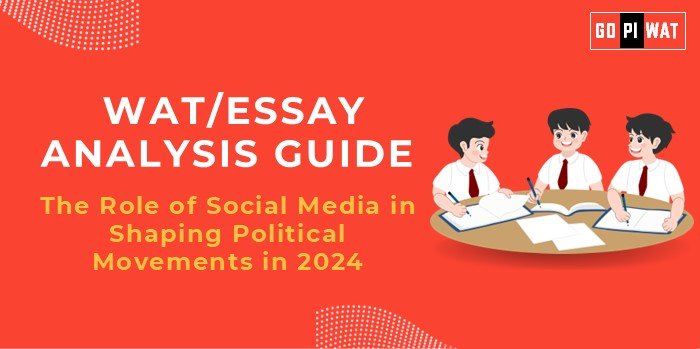📋 WAT/Essay Analysis Guide: The Role of Social Media in Shaping Political Movements in 2024
🌐 Understanding the Topic’s Importance
Social media’s impact on political movements is critical for B-schools as it connects to leadership, digital transformation, and governance in a globalized society.
📝 Effective Planning and Writing
⏱️ Time Allocation: Reading & Planning (5 minutes), Writing (20 minutes), Review (5 minutes).
🧠 Preparation Tips: Gather recent statistics, focus on case studies, and identify primary stakeholders.
🖊️ Introduction Techniques for Essays
- Contrast Approach: “While social media mobilizes millions for social causes, it also polarizes societies through echo chambers and misinformation.”
- Solution-Based Approach: “Addressing misinformation while preserving free speech remains the core challenge for social media’s role in politics.”
- Timeline Introduction: “Since 2008’s Obama campaign, social media’s political influence has grown exponentially, culminating in pivotal roles across global elections.”
📊 Structuring the Essay Body
Organize your content into key areas:
- 🏅 Achievements: Increased political mobilization and awareness, successful campaigns.
- ⚠️ Challenges: Misinformation spread, algorithm-driven polarization, data privacy concerns.
- 🔮 Future Outlook: Regulation, digital literacy initiatives, ethical platform governance.
📄 Concluding Effectively
- Balanced Perspective: “Social media democratizes political discourse but requires robust checks to mitigate misinformation risks.”
- Global Comparison: “Global examples illustrate both the potential and pitfalls of politically driven social media.”
📈 Analyzing Successes and Shortcomings
- Key Achievements: Greater political engagement, grassroots mobilization.
- Ongoing Challenges: Regulation issues, echo chambers, data misuse.
- Global Context: Different regulatory approaches—EU vs. US.
💡 Recommendations for Sustainable Progress
- 📜 Recommendation 1: Strengthen regulations on misinformation and political ads.
- 📚 Recommendation 2: Promote digital literacy to enhance critical engagement.
- 🤝 Recommendation 3: Foster ethical partnerships between tech firms and governments.
✍️ Sample Short Essays (100 Words)
1. Balanced Perspective: “Social media’s influence in political movements exemplifies its dual power to unite and divide. While it empowers grassroots activism and democratizes discourse, unchecked algorithms and misinformation spread threaten democratic norms. Effective regulation and user education hold the key to leveraging its transformative power responsibly.”
2. Solution-Oriented: “To maximize the benefits of social media’s political influence, stakeholders must address misinformation and platform biases. Stricter regulations, coupled with increased transparency and user awareness, can counter its polarizing effects while maintaining its democratic potential.”
3. Global Comparison: “In the US and India, social media has shaped political campaigns and protests alike. Yet, contrasting regulatory environments show differing challenges: data privacy in the US vs. censorship concerns in India. Bridging these gaps is key to global governance of digital movements.”


